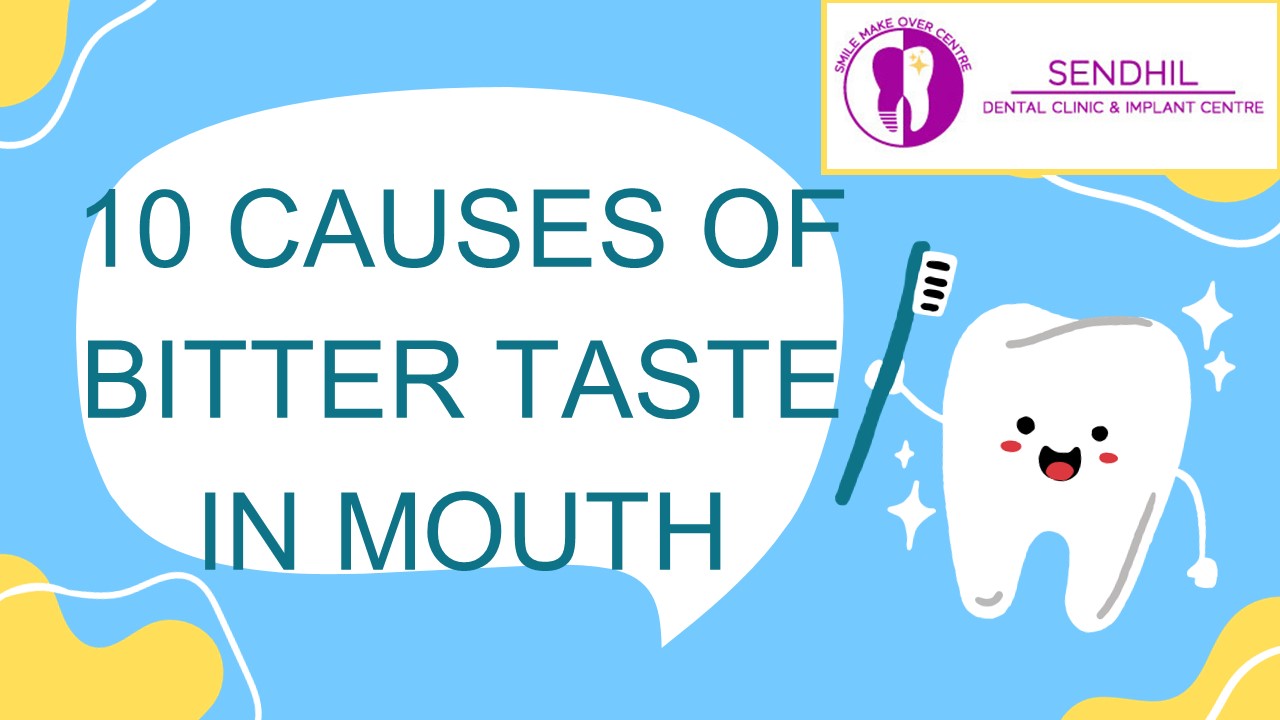10 Causes of Bitter Taste in Mouth (1) - PowerPoint PPT Presentation
Title:
10 Causes of Bitter Taste in Mouth (1)
Description:
Learn the 10 most typical reasons for a bitter taste in the mouth, which range from drugs to dental problems, as well as how to recognise and treat this uncomfortable symptom. – PowerPoint PPT presentation
Number of Views:0
Date added: 10 May 2024
Slides: 16
Provided by:
sendhildentalcare
Category:
Medicine, Science & Technology
Tags:
Title: 10 Causes of Bitter Taste in Mouth (1)
1
10 CAUSES OF BITTER TASTE IN MOUTH
2
INTRODUCTION
Have you ever woken up with an enduringly bitter
taste in your mouth? More than just a bother, a
bitter taste in your mouth can have an impact on
your general well-being, social relationships,
and food satisfaction. Let's examine the top 10
reasons why people get a bitter aftertaste in
their mouths in this blog.
3
CAUSES OF BITTER TASTE IN MOUTH
POOR ORAL HYGIENE
When you skip brushing and flossing, bacteria
thrive in your mouth, leading to plaque buildup.
This buildup can cause a bitter taste as bacteria
break down food particles and release
foul-smelling gases. So, maintaining a consistent
oral hygiene routine is crucial to keep your
mouth fresh and clean.
4
MEDICATIONS
Some medications, like antibiotics,
antidepressants, and blood pressure drugs, can
alter your taste buds sensitivity, leaving a
bitter or metallic taste in your mouth. This
occurs due to the drugs chemical composition
interacting with your taste receptors. If you
suspect your medication is causing this, dont
hesitate to discuss it with your doctor, who may
suggest an alternative or adjustment.
5
DEHYDRATION
Your saliva acts as a natural cleanser for your
mouth, washing away food particles and
neutralizing acids. When dehydrated, saliva
production decreases, allowing bacteria and acids
to linger longer, leading to a bitter taste.
Drinking plenty of water throughout the day helps
maintain saliva production and keeps your mouth
hydrated and fresh.
6
DIETARY FACTORS
Certain foods and drinks, such as acidic fruits,
spicy dishes, coffee, and alcohol, can trigger a
bitter taste sensation. This happens because
these items stimulate excess stomach acid
production or leave a residue that alters your
mouths pH balance. Moderating your consumption
of these items can help reduce the likelihood of
experiencing a bitter taste.
7
GASTROESOPHAGEAL REFLUX DISEASE (GERD)
GERD occurs when stomach acid flows backward into
the esophagus, often causing heartburn and a
bitter taste in the mouth. This happens due to a
malfunctioning sphincter muscle at the bottom of
the esophagus. Managing GERD through dietary
changes, weight loss, and medication can help
alleviate symptoms, including the bitter taste.
8
ORAL INFECTIONS
Infections such as gingivitis (gum disease) or
oral thrush (a fungal infection) can disrupt the
balance of bacteria in your mouth, leading to
inflammation and a bitter taste. Proper oral
hygiene, including brushing, flossing, and
regular dental check-ups, can prevent these
infections and maintain a healthy mouth
environment.
9
SMOKING
Smoking stains your teeth, contributes to gum
disease, and leaves a persistent bitter taste in
your mouth. The chemicals in tobacco smoke can
linger on your tongue and throat, altering your
taste perception. Quitting smoking can improve
your overall oral health and eliminate this
unpleasant taste.
10
SINUS INFECTIONS
Sinusitis, or inflammation of the sinuses, can
cause mucus to accumulate and drip down the back
of your throat, resulting in a bitter taste.
Treating the underlying sinus infection with
decongestants, nasal irrigation, or antibiotics
can help alleviate this symptom and restore
typical taste sensations.
11
PREGNANCY
Hormonal changes during pregnancy can sometimes
lead to a condition called pregnancy
gingivitis, characterized by swollen, tender
gums and a metallic or bitter taste in the mouth.
Maintaining good oral hygiene and regular dental
visits can help manage these symptoms and ensure
optimal oral health during pregnancy.
12
STRESS AND ANXIETY
Mental health issues like stress and anxiety can
affect your body in various ways, including
altering your taste perception. Stress hormones
can disrupt the balance of saliva production and
change the way your brain interprets taste
signals, leading to a bitter or metallic taste.
Stress-reduction techniques such as mindfulness,
exercise, and deep breathing can help alleviate
this symptom and promote overall well-being.
13
IMPACT OF BITTER TASTE ON MOUTH
A bitter taste in the mouth can disrupt social
interactions, diminish enjoyment of food, and
lead to dietary restrictions, potentially
impacting nutrition and overall health.
Additionally, it may signal underlying health
conditions, causing emotional distress and
affecting quality of life. Prompt evaluation and
treatment are essential to address symptoms and
improve well-being.
14
CONCLUSION
15
CONTACT US
9677096264 044 42634495
THANK YOU
www.sendhildental.com
?www.sendhildental.com
sendhildental_implant_centre
sendhildental_implant_centre
sendhildental_implant_centre































